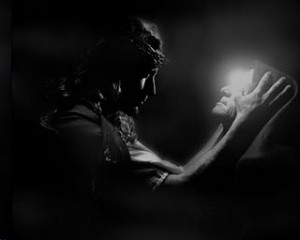 Today’s Gospel reading at Mass cites a unique incident from Jesus’ career: a two-stage healing.
Today’s Gospel reading at Mass cites a unique incident from Jesus’ career: a two-stage healing.
When Jesus and his disciples arrived at Bethsaida, people brought to him a blind man and begged Jesus to touch him. He took the blind man by the hand and led him outside the village. Putting spittle on his eyes he laid his hands on the man and asked, “Do you see anything?” Looking up the man replied, “I see people looking like trees and walking.” Then he laid hands on the man’s eyes a second time and he saw clearly; his sight was restored and he could see everything distinctly. Then he sent him home and said, “Do not even go into the village” (Mark 8:22-26).
There are two things we can learn from this:
1. This is more historical proof of Jesus as a wonderworker. No Christian is going to make up an account about Jesus’ healing not quite “working” the first time, especially when so many of Jesus’ miraculous deeds (healings, exorcisms, nature miracles) happen instantaneously, at his word, even from a distance. This smacks of authenticity and eyewitness detail. Furthermore, this is more evidence that the evangelists didn’t feel free to “invent” incidents from the life of Christ, or feel free to “edit” accounts of Jesus’ life that were passed on by tradents and collected into the Gospels. If that were the case, this account would have almost certainly been “cleaned up” by the evangelist, with the healing working at once.
2. This is a “sacramental” healing. Jesus didn’t need to take spittle and use that to heal the man’s vision. But the fact that he did shows that God can use matter to communicate his grace – that is, his very life. This should be obvious when considering the Incarnation itself. The body of Christ communicated, and was the very vehicle, of the life of God on earth. And Christ continues to communicate his healing powers through the sacraments of the Catholic Church. The sacraments each take ordinary, physical materials – water, bread, wine, oil – and, in the case of marriage, the very bodies of the spouses themselves – to communicate the life-giving power of God. The Eucharist, of course, is the greatest of all sacraments, because, as Saint Thomas aquinas once said, in all the other sacraments, the power of Christ is present; in the Eucharist, Christ himself is present – Body, Blood, Soul, and Divinity.
The sacraments of the Church bring the power to see life and eternity – all of reality – in ever clearer and sharper focus. Like the blind man, we don’t always see this clearly at first, even after receiving the sacraments. We have to go “outside the village” and never go back in, like Christ led out the blind man – we must leave our old ways behind. And, as Saint Jerome taught, the “spittle” of Christ, which represents his word, his teaching, must be applied to our lives – that is, obeyed – for the healing of our lives to be complete.

